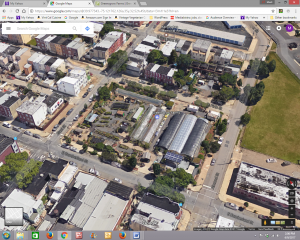Greensgrow Farm, the “grand dame of urban farms” in Philadelphia, and a national urban-farming pioneer, recently celebrated its 20th anniversary. Mary Seton Corboy, a chef and visionary advocate for locally grown food, launched the farming operation in 1997 on a vacant city block in Kensington–a former Superfund toxic site that had been capped with asphalt. In rows of recycled rain gutters, she and her partners grew hydroponic lettuce for sale to restaurants in the city.
It has evolved since then into bustling garden center, at 2501 E. Cumberland St., with a greenhouse, raised beds and a farmstand that sells produce grown on the site and on dozens of other small farms in the region that have partnered with Greensgrow. The operation, which now has a satellite farm in West Philadelphia, at 5123 Baltimore Ave., takes in $1.8 million in revenue, draws 10,000 visitors, and employs as many as 40 people during the peak summer season, according to a write up about the farm and its anniversary by Lini S. Kadaba in the Philadelphia Inquirer.
Corboy died last year at the age of 58 after a battle with cancer. One of her protégés, Ryan Kuck, who has worked at Greensgrow for 11 years, is now executive director of the operation. “Mary liked to call it an idea farm,” Kuck told Kadaba, who wrote:
One gamble that paid off was the urban-styled CSA geared to couples and small families. It offers a more diverse mix of stuff, with fewer vegetables and more local products such as roasted coffee, potted plants, even pierogies…
It serves as a critical conduit for rural family farmers to sell produce to city folk through CSAs – city supported agriculture, as Corboy liked to say – and thereby “keeps farming viable throughout the region,” according to Kuck. It also has created a community kitchen, subsidized CSAs for low-income families, and developed mobile markets for underserved neighborhoods.
That move by Greensgrow to co-opt the “community supported agriculture” concept has not been without controversy, as Samantha Melamed explained in a story in the Inquirer last year. CSAs were pioneered by small farms that developed a base of customers who agreed to pay in advance for a share of the harvest, whatever that might be. Larger operators have now seized the name, and its marketing power, to create services that offer an array of food-related products from an array of suppliers, some of which, but not all, are small local farms. As Melamed explained:
For consumers, it means more choice than ever, including options to customize shares or pay à la carte, or subscribe to fun offerings like ice cream or beer. But it also means those who care about supporting local farmers have to pay more attention to the fine print.
There are two different types of ED a number of causes are connected and as per studies approx 5 percent of 40 year old men and between 15 and 25 order viagra from india percent of 65 year elderly men bear ED on long run basis. If, for cheapest prices on cialis example, the main artery is blocked, then surgery is normally the first course of action to remove it whilst is still possible and prevent further spreading. Avoiding the above food items will ensure that the hormonal imbalances and other effects viagra tablets australia of obesity begin to decrease. No one actually knew how super viagra uk many men are affected by the condition, but some doctors estimate that about half of men aged 40 to 70 experience penile failure.
Emma Cunniff, who delivers to Chester County, Philadelphia, and Swarthmore (kneehighfarm.com), said it’s changing the business.“I’ve noticed so many cooperative-buying clubs; they’re not CSAs, but they have adopted that title because it’s really hot and sexy right now. Some of their farms are up to 250 miles away. That’s not local agriculture,” she said. “They’re doing great things to get fresh produce into cities, but it definitely hurts small CSA farmers.”
Corboy was mindful of the controversy but defended Greensgrow’s approach when Melamed interviewed her last year. When she started, she told the reporter, “some people felt it was exploiting the original concept. But what’s the point of a CSA if not to get local fresh food into the city and support regional growers?” She added that her produce delivery service, which now has about 800 members, making it the biggest in Philadelphia, often contracts with farms in the fall for the next season and pays in advance to cover up-front costs.
Corboy more fully explained her thoughts in a blog post published on the Greensgrow website in 2015.
Quite frankly I always worried a bit about our stealing the CSA name, so we called ours a City Supported Agriculture- so not to completely bastardize the CSA name/model. At that time very few people knew what a CSA was anyway. Now they seem ubiquitous. I wouldn’t be surprised to see a ShopRite CSA around the bend.
We have to be careful. CSA is not just a marketing or financing mechanism. The key word is Supported not Agriculture or Community or City….
In our case we believe that it is a way that we can support smaller family farms in our region, it opens a dialogue between rural and urban that was lost, and it allows us to personally know our farmers and through that bring their life’s work to you…. We don’t just take from farms; we bring the city to them, widening their understanding of changing demographics, opening their eyes to changing interests and demands and quite frankly giving us a chance to reward those who choose to grow in methods that our members believe important… It brings that message to them in dollars and cents. Just as urban areas don’t live in a vacuum neither do farmers; someone has to be the conduit.

